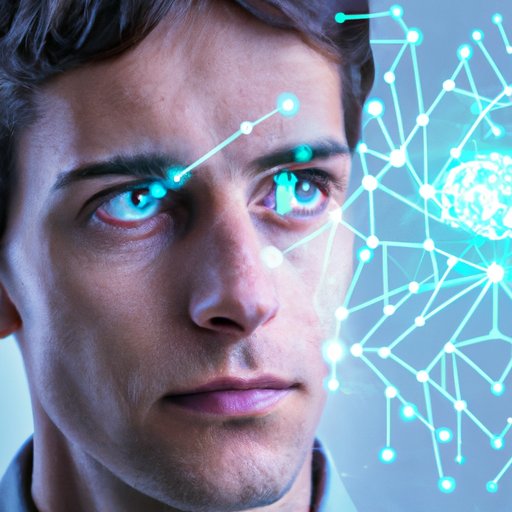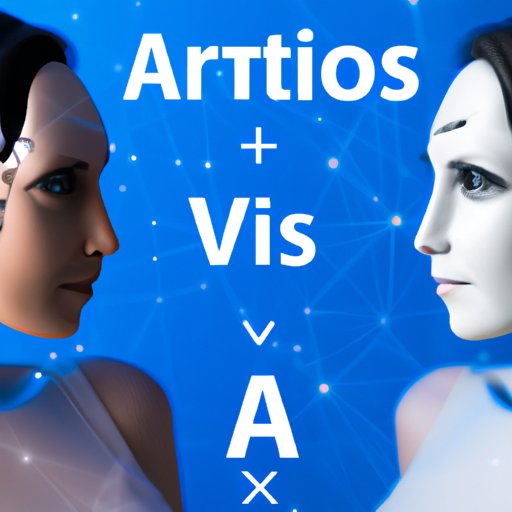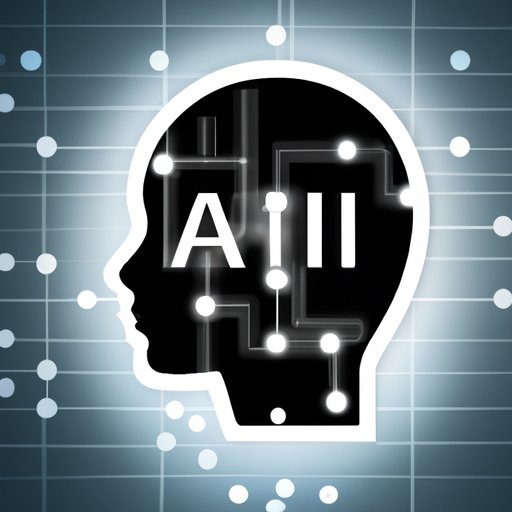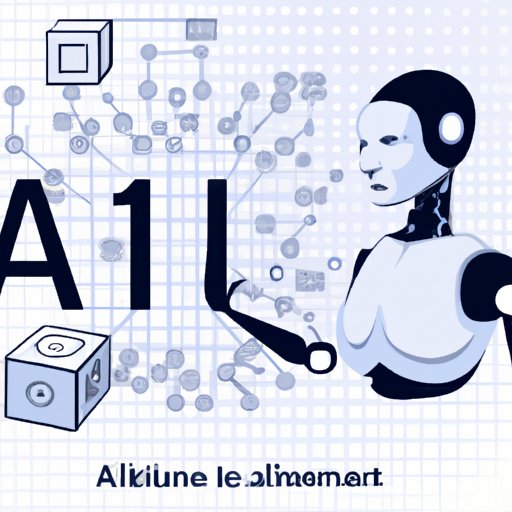Introduction
The concept of artificial intelligence (AI) is one that has long captivated the imagination of scientists and philosophers alike. But what is AI, and why is it such a hot topic?
AI is defined as “the theory and development of computer systems able to perform tasks normally requiring human intelligence, such as visual perception, speech recognition, decision-making, and translation between languages” (Oxford Languages). In other words, AI refers to machines or computer programs that are capable of performing tasks that humans would traditionally do.
In recent years, AI has become increasingly popular, largely due to the rapid advances in technology. As AI technology continues to improve, it has begun to have a profound impact on many aspects of our lives, from how we communicate to how we make decisions. This has sparked a growing debate over whether AI is truly “real” and what its implications might be for the future.

Examining the Latest Advances in Artificial Intelligence
In order to understand the debate over whether AI is real, it is important to first consider the latest advances in AI technology. There have been several major breakthroughs in the field of AI in recent years, including the following:
Breakthroughs in Machine Learning
Machine learning is a type of AI that enables computers to learn from data without being explicitly programmed. Through machine learning, computers can identify patterns in data and use them to make predictions or decisions. Recent advances in machine learning have enabled computers to do things like recognize faces, respond to voice commands, and even drive cars.
Automation and Robotics
Automation and robotics are two other areas where AI technology has made great strides. Automation refers to the use of machines to automate processes that were previously performed by humans. Robotics, on the other hand, involves the use of robots to perform tasks that would otherwise be too complex or dangerous for humans to do. Recent advances in these fields have enabled robots to perform tasks such as assembling products, delivering packages, and even performing surgery.
Natural Language Processing
Natural language processing (NLP) is another area of AI that has seen significant advances in recent years. NLP involves the use of computers to process and understand natural language, such as spoken or written text. Recent advances in NLP have enabled computers to understand and respond to human speech, as well as to generate written documents.
Exploring the Debate Over Whether AI is Real
The debate over whether AI is real has been raging for some time, with both sides pointing to evidence to support their arguments. To better understand this debate, it is important to first consider the definition of AI.
The Definition of Artificial Intelligence
The definition of AI has been the subject of much debate. Some argue that AI should be defined as “the ability of a machine to think and act like a human” (Khoury et al., 2019), while others contend that AI should be defined as “the study of intelligent agents” (Russell & Norvig, 2016). Ultimately, the definition of AI will likely remain open to interpretation.
AI as a Tool or an Agent
At the heart of the debate over AI’s reality is the question of whether AI should be viewed as a tool or an agent. Those who view AI as a tool argue that it is simply a set of algorithms designed to help humans solve problems. On the other hand, those who view AI as an agent argue that it is capable of making autonomous decisions and taking action on its own. Ultimately, this debate comes down to a matter of perspective.
Arguments for and Against AI’s Reality
Proponents of AI point to the fact that machines are now capable of completing tasks that were once considered impossible. For example, AI systems are now capable of playing chess and winning against human opponents, driving cars autonomously, and even diagnosing medical conditions. These feats of AI are powerful evidence in favor of its reality.
On the other hand, critics of AI often point to the fact that machines are still limited in their capabilities. They argue that machines are not yet capable of understanding complex concepts or exhibiting true creativity. As Dr. Stuart Russell, professor of Computer Science at University of California, Berkeley, states, “No machine today has anything remotely resembling general intelligence.”

Understanding the Pros and Cons of AI
Regardless of whether AI is “real” or not, it is undeniable that it has the potential to revolutionize many aspects of our lives. However, it is important to consider both the benefits and limitations of AI before embracing it wholeheartedly.
Benefits of AI
One of the most obvious benefits of AI is its ability to automate tedious and time-consuming tasks. By automating tasks, AI can free up time for humans to focus on more creative and meaningful work. Additionally, AI can also help to reduce errors and increase efficiency in many areas, such as healthcare and manufacturing.
Limitations of AI
Despite its potential benefits, AI also has its limitations. AI systems are only as good as the data they are fed, which means they can be prone to bias and errors. Additionally, AI systems require considerable resources to develop and maintain, which can be cost prohibitive for some organizations. Finally, AI raises ethical concerns about accountability and privacy.

Investigating the Impact of AI on Society
The potential impact of AI on society is an important consideration when debating its reality. There are a number of potential impacts that AI could have on society, both positive and negative.
Potential to Disrupt Employment
One of the most commonly cited potential impacts of AI is its potential to disrupt employment. As AI technology continues to improve, it could lead to large-scale job losses in certain industries, such as manufacturing and transportation. This could lead to increased inequality and poverty, as well as social unrest.
Potential to Reduce Inequality
On the other hand, AI also has the potential to reduce inequality. AI systems can be used to automate tedious and low-paying jobs, freeing up people to pursue more meaningful work. Additionally, AI can be used to detect and address systemic biases, thus reducing discrimination in the workplace.
Potential to Create New Opportunities
Finally, AI also has the potential to create new opportunities. AI systems can be used to analyze vast amounts of data and uncover patterns and insights that humans may not have been able to detect. This can lead to new and innovative products and services, as well as more efficient ways of doing business.
Analyzing the Potential of AI to Change Our Lives
As AI technology continues to improve, it has the potential to drastically change many aspects of our lives. Here are just a few examples of how AI could potentially change our lives:
AI in Education
AI could revolutionize the way we learn. AI systems could be used to personalize learning experiences, help students prepare for tests, and even grade assignments. Additionally, AI could be used to detect and address learning gaps, thus helping to ensure that all students receive a quality education.
AI in Medicine
AI could also revolutionize the healthcare industry. AI systems could be used to diagnose medical conditions, monitor patients, and even recommend treatments. Additionally, AI could be used to analyze massive amounts of medical data, thus helping to uncover new treatments and cures.
AI in Business
Finally, AI could also have a dramatic impact on the business world. AI systems could be used to automate tedious and time-consuming tasks, such as accounting and bookkeeping. Additionally, AI could be used to analyze massive amounts of data and uncover valuable insights that could help businesses make better decisions.
Conclusion
In conclusion, AI is a rapidly evolving technology that has the potential to revolutionize many aspects of our lives. While there is still much debate over whether AI is “real” or not, it is undeniable that it has the potential to drastically change the way we live and work. As AI technology continues to improve, it is important to consider both the potential benefits and limitations of AI, as well as its potential impact on society.
Ultimately, it is up to us to decide how best to use AI and ensure that its benefits are maximized and its risks are minimized. With the right approach, AI has the potential to improve our lives in ways that we can scarcely imagine.
(Note: Is this article not meeting your expectations? Do you have knowledge or insights to share? Unlock new opportunities and expand your reach by joining our authors team. Click Registration to join us and share your expertise with our readers.)
